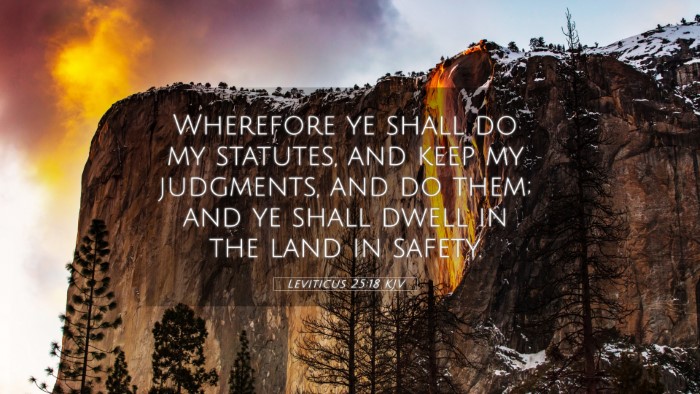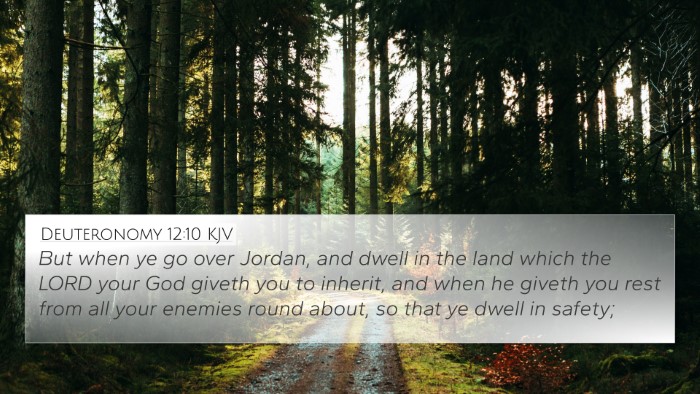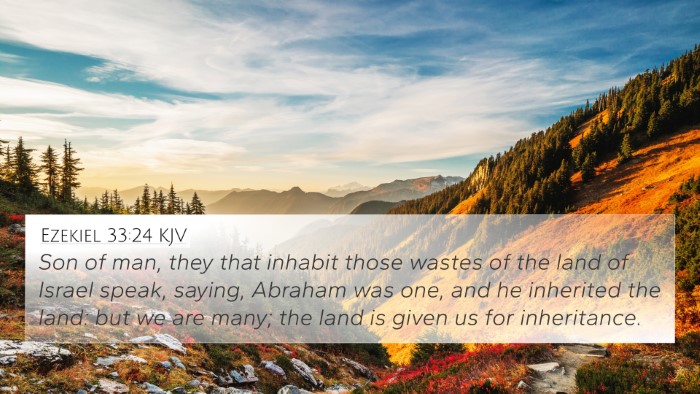Meaning and Explanation of Leviticus 25:18
Verse Reference: Leviticus 25:18 - "Wherefore ye shall do my statutes, and keep my judgments, and do them; and ye shall dwell in the land in safety."
Overview of Leviticus 25:18
This verse serves as a directive from God to the people of Israel regarding their conduct while inhabiting the Promised Land. It emphasizes the importance of obedience to divine statutes for their prosperity and safety.
Commentary Insights
-
Matthew Henry's Commentary
Matthew Henry highlights the significance of obedience in this verse. He explains that the laws and statutes provided by God are for the purpose of ensuring the well-being and safety of His people. Henry notes that living according to God's commandments results in a secure dwelling and peace in the land.
-
Albert Barnes' Notes on the Bible
Albert Barnes focuses on the relational aspect of God's commandments. He points out that the observance of statutes is a reflection of a faithful covenant relationship with God. Barnes emphasizes that the promise of safety in the land is contingent upon the people's adherence to God's judgments.
-
Adam Clarke's Commentary
Adam Clarke emphasizes the holistic approach of the commandments, suggesting that they encompass moral, ethical, and social dimensions. He argues that obedience not only leads to physical safety but also ensures spiritual prosperity. Clarke connects this obedience to the broader covenant theme throughout the Scriptures.
Bible Cross-References
This verse connects with numerous other biblical texts that reinforce the themes of obedience and divine protection. Here are some notable examples:
- Deuteronomy 5:33: "Ye shall walk in all the ways which the Lord your God hath commanded you, that ye may live, and that it may be well with you."
- Psalm 119:1-2: "Blessed are the undefiled in the way, who walk in the law of the Lord. Blessed are they that keep his testimonies, and that seek him with the whole heart."
- Isaiah 1:19: "If ye be willing and obedient, ye shall eat the good of the land."
- John 14:21: "He that hath my commandments, and keepeth them, he it is that loveth me: and he that loveth me shall be loved of my Father, and I will love him, and will manifest myself to him."
- Romans 2:13: "For not the hearers of the law are just before God, but the doers of the law shall be justified."
- James 1:22: "But be ye doers of the word, and not hearers only, deceiving your own selves."
- Malachi 2:2: "If ye will not hear, and if ye will not lay it to heart, to give glory unto my name, saith the Lord of hosts, I will even send a curse upon you..."
Connections and Themes
The themes present in Leviticus 25:18 resonate throughout the Scriptures, showcasing a consistent message regarding divine laws and safety:
- Obedience and Blessing: The correlation between obeying God and experiencing His blessings is a recurring theme in biblical texts.
- Covenantal Relationship: The notion that adherence to God's statutes is essential to maintaining a covenant with Him.
- Spatial Security: Safety in the land symbolizes not just a physical location, but a spiritual state assured by God's constant presence.
- Cross-Testament Relevance: The importance of obedience stretches across both the Old and New Testaments, linking the teachings of Jesus back to the laws given to Israel.
Thematic Bible Verse Connections
Leviticus 25:18 can be linked with various biblical verses that address similar themes, offering a rich tapestry of interconnected teachings:
- Exodus 19:5: "Now therefore, if ye will obey my voice indeed, and keep my covenant, then ye shall be a peculiar treasure unto me above all people."
- Proverbs 1:33: "But whoso hearkeneth unto me shall dwell safely, and shall be quiet from fear of evil."
- Galatians 6:16: "And as many as walk according to this rule, peace be on them, and mercy, and upon the Israel of God."
Conclusion
In conclusion, Leviticus 25:18 serves as a vital reminder of the importance of obedience to God's statutes for the well-being and safety of His people. Through cross-referencing with other scriptures, we can see the breadth of this concept. Utilizing tools for Bible cross-referencing, such as concordances and guides, enables deeper understanding of the connections between Bible verses and enhances our study and application of biblical teachings.



















